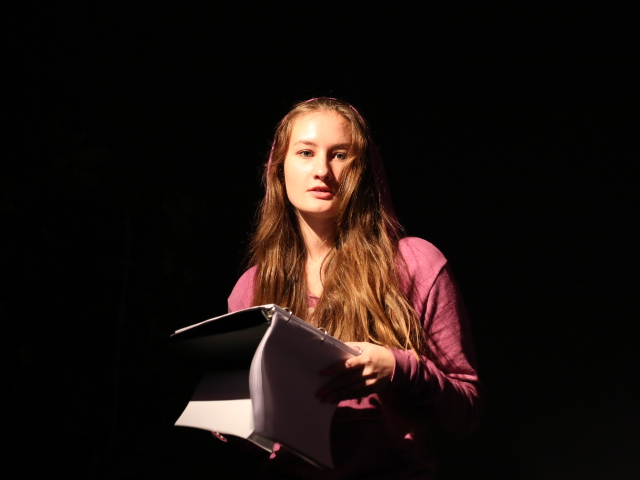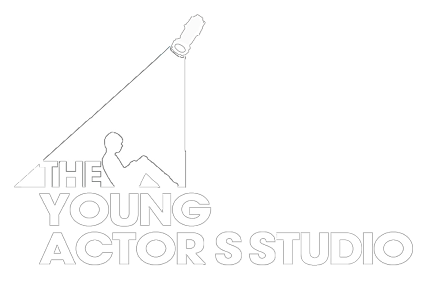- Feel free to contact us with any questions!
- 818-210-3821
- office@youngactorsstudio.com

Growing up can sometimes be a painful and stressful time. Many kids come to our acting school closed off and quiet. Some have been taught by various authority figures to “Keep it down!” “Don’t be so emotional!” and so forth. Then, they walk into our studio, and I say, “Get your voice out!”, “Make sound and let it out!”. Oftentimes it can take an actor many months to finally allow themselves to get loud. Most kids say to me that it doesn’t feel natural to speak loudly. The truth of the matter is that we were born as infants connected emotionally by many loud sounds. We were trained to keep quiet. When students come in and do acting exercises, I notice the emotions start to fly as soon as they let themselves make sounds that are loud.
As an actor you need complete control of your voice. You need to be able to reach the audience wherever it’s at. It can be as far back as the balcony of a huge Broadway theatre or as close as the microphone on your shirt or jacket. The actor needs to be able to send sound to wherever it needs to go.
The actor’s voice is twofold. First you need to protect the vocal instrument and second you need to be able allow the voice to express itself fully.
Part 1: The Technical Voice
Here are some vocal exercises that you can do to warm up:
1. Breath. It all starts with air. Try filling up your lungs and stomach with air and use your lower abs to create a sustained “ssssss” sound. When you run out of air, stop. Do this 10 times. This is your support. This is where volume comes. This is what will protect your vocal cords from injury during any loud scene. When the air stops, the sound should stop.
2. Relax the throat. The kindest thing you can do for yourself is warm up in the place that your voice is naturally at. Yawns are fantastic for relaxing the back of the throat. High pitch easy sounds are great for opening the vocal area. Do vocal “ahhs” going from low to high.
- Once your voice is feeling warm, move slowly to volume. Try sustaining a clear open “Ma” sound. You should be directing the sound to the mask while doing this. You should actually feel the vibration through the nose. Now try the phrase: “Many mumbling moaning merry men making much money in the month of May!” Allow the “m” sound to be supported and let the throat fully open in the back and keep the air support sending the sound out and explode.
- Explore vocal power by panting like a dog. “Ha ha ha ha”. Next add sound and explode that sound. The “h” sound is important because it has the air in it. That air supports the sound without falling back in the throat.
- Pretend you are yelling up and down the Grand Canyon by exploring volume and strength. Try yelling “HELOOOOOOOOOOOOOO” Going from high to low to high again. The “h” supports the sound. Try it again with “Hey There”. Hey Theeeeeeeeeeeeere!! The “th” should be voiced and help explode into a full “thaeaaaaaaaaaare” sound.
Part 2: The Emotional Voice
Using your voice affects your mood. Recently I’ve noticed that vocal work can play a strong role in developing great acting. You feel different when you speak different. Here are some fun ways to get deeper acting work while strengthening the voice.
- Talk in a deep sound. Take any monologue or nursery rhyme that you know. Practice speaking in your lower register. Speak as clearly and deeply as you can. Support the sound by talking loudly. Do this for at least 20 minutes. Notice how your feel afterwards? You may feel confident, evil, scary, intimidating, or afraid. Everyone is different. One time I was working on a play and I was re-telling a story of a scary event that I lived through and the director said to me, “Your voice dropped deep during the story, Use THAT voice for the character. I did, and it worked! By simply talking deeper I felt like the criminal that I was acting!
- Take the voice out on a date! Go somewhere and try talking in that voice to somebody you don’t know. For example, go to Target and ask where the televisions are located to a clerk and see how they respond. Notice how you feel afterwards. Is there a mood happening?
- Play with volume on your vocal date. For example, try a bellowing voice at the dinner table. Say: “Please pass the bread!” in a loud strong confident sound. See if that makes you feel more confident.
- Try an accent. Listen to a movie with an accent that you want to copy. If you have a good ear, copy the sounds you hear. If you struggle with the sounds, try differentiating 4 changes that you hear in the accent. Practice these sounds and compare them to the movie that you are listening too. Do this twice a day for a week until it feels natural. Remember repetition brings it to life. It may take a lot of repetition, but it will get there. Once you feel ready, go on a date with the voice and order something at a restaurant or at store. If the worker says, “where are you from?” Make something up and go home and celebrate! You just created a different character, using only sound.
- YELL OUT! – With monologue work or scene work – When you are rehearsing and you feel stuck try yelling out what you are actually This is called speaking out. Once you speak out, the blockage dissipates, and you are fully feeling. An example of speaking out can sound like this: “THIS ISN’T WORKING I’M LOUSY AT ACTING, THIS FEELS FORCED, CLOSED OFF AND DEAD!!! HUH!! HUH! HA!!! These sounds (Ha, Huh) are literally just that. They are explosives that express the years of cut off emotions. If you commit to those sounds the emotion will follow. Freedom will follow. Continue the monologue or scene. It will take a new life.
There is a cry within us. We need to make sound but are taught to keep quiet. Once you allow the sound to come, the reality of what you are acting begins to take hold.
